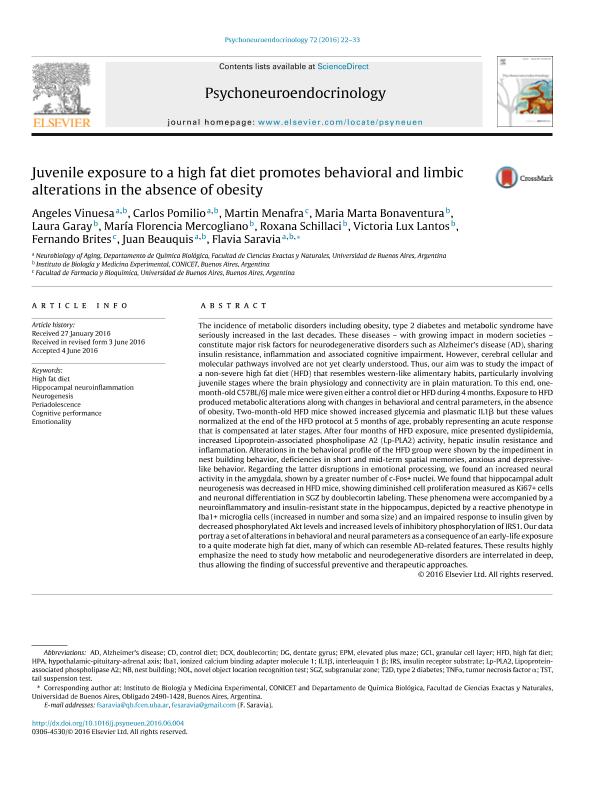Artículo
Juvenile exposure to a high fat diet promotes behavioral and limbic alterations in the absence of obesity
Vinuesa, María Angeles ; Pomilio, Carlos Javier
; Pomilio, Carlos Javier ; Menafra, Martín; Bonaventura, Maria Marta
; Menafra, Martín; Bonaventura, Maria Marta ; Garay, Laura Ines
; Garay, Laura Ines ; Mercogliano, María Florencia
; Mercogliano, María Florencia ; Schillaci, Roxana
; Schillaci, Roxana ; Lux, Victoria Adela R.
; Lux, Victoria Adela R. ; Brites, Fernando Daniel
; Brites, Fernando Daniel ; Beauquis, Juan
; Beauquis, Juan ; Saravia, Flavia Eugenia
; Saravia, Flavia Eugenia
 ; Pomilio, Carlos Javier
; Pomilio, Carlos Javier ; Menafra, Martín; Bonaventura, Maria Marta
; Menafra, Martín; Bonaventura, Maria Marta ; Garay, Laura Ines
; Garay, Laura Ines ; Mercogliano, María Florencia
; Mercogliano, María Florencia ; Schillaci, Roxana
; Schillaci, Roxana ; Lux, Victoria Adela R.
; Lux, Victoria Adela R. ; Brites, Fernando Daniel
; Brites, Fernando Daniel ; Beauquis, Juan
; Beauquis, Juan ; Saravia, Flavia Eugenia
; Saravia, Flavia Eugenia
Fecha de publicación:
10/2016
Editorial:
Elsevier
Revista:
Psychoneuroendocrinology
ISSN:
0306-4530
e-ISSN:
1873-3360
Idioma:
Inglés
Tipo de recurso:
Artículo publicado
Clasificación temática:
Resumen
The incidence of metabolic disorders including obesity, type 2 diabetes and metabolic syndrome have seriously increased in the last decades. These diseases - with growing impact in modern societies - constitute major risk factors for neurodegenerative disorders such as Alzheimer's disease (AD), sharing insulin resistance, inflammation and associated cognitive impairment. However, cerebral cellular and molecular pathways involved are not yet clearly understood. Thus, our aim was to study the impact of a non-severe high fat diet (HFD) that resembles western-like alimentary habits, particularly involving juvenile stages where the brain physiology and connectivity are in plain maturation. To this end, one-month-old C57BL/6J male mice were given either a control diet or HFD during 4 months. Exposure to HFD produced metabolic alterations along with changes in behavioral and central parameters, in the absence of obesity. Two-month-old HFD mice showed increased glycemia and plasmatic IL1β but these values normalized at the end of the HFD protocol at 5 months of age, probably representing an acute response that is compensated at later stages. After four months of HFD exposure, mice presented dyslipidemia, increased Lipoprotein-associated phospholipase A2 (Lp-PLA2) activity, hepatic insulin resistance and inflammation. Alterations in the behavioral profile of the HFD group were shown by the impediment in nest building behavior, deficiencies in short and mid-term spatial memories, anxious and depressive- like behavior. Regarding the latter disruptions in emotional processing, we found an increased neural activity in the amygdala, shown by a greater number of c-Fos+ nuclei. We found that hippocampal adult neurogenesis was decreased in HFD mice, showing diminished cell proliferation measured as Ki67+ cells and neuronal differentiation in SGZ by doublecortin labeling. These phenomena were accompanied by a neuroinflammatory and insulin-resistant state in the hippocampus, depicted by a reactive phenotype in Iba1+ microglia cells (increased in number and soma size) and an impaired response to insulin given by decreased phosphorylated Akt levels and increased levels of inhibitory phosphorylation of IRS1. Our data portray a set of alterations in behavioral and neural parameters as a consequence of an early-life exposure to a quite moderate high fat diet, many of which can resemble AD-related features. These results highly emphasize the need to study how metabolic and neurodegenerative disorders are interrelated in deep, thus allowing the finding of successful preventive and therapeutic approaches.
Palabras clave:
Insulin
,
Neurogenesis
,
Hyppocampus
,
High Fat Diet
Archivos asociados
Licencia
Identificadores
Colecciones
Articulos(IBYME)
Articulos de INST.DE BIOLOGIA Y MEDICINA EXPERIMENTAL (I)
Articulos de INST.DE BIOLOGIA Y MEDICINA EXPERIMENTAL (I)
Articulos(OCA HOUSSAY)
Articulos de OFICINA DE COORDINACION ADMINISTRATIVA HOUSSAY
Articulos de OFICINA DE COORDINACION ADMINISTRATIVA HOUSSAY
Citación
Vinuesa, María Angeles; Pomilio, Carlos Javier; Menafra, Martín; Bonaventura, Maria Marta; Garay, Laura Ines; et al.; Juvenile exposure to a high fat diet promotes behavioral and limbic alterations in the absence of obesity; Elsevier; Psychoneuroendocrinology; 72; 10-2016; 22-33
Compartir
Altmétricas



